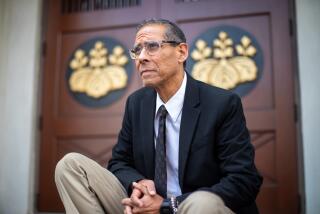Ex-CYA Inmate Is Honored : Corrections: Ten years after shooting a rival gang member, the Van Nuys resident has turned his life around.
- Share via
Eric Jones was a 14-year-old dropout making $1,500 a week in a Los Angeles rock house when he gunned down a rival gang member from about 10 feet away.
For Jones, 10 years have passed since the 1984 drive-by killing, seven of them behind bars. He says he can read now. He has a family. He works.
The 23-year-old Van Nuys resident has been hailed as an “outstanding alumnus” of the federally funded Job Training Policy Council, which helped ease Jones’ return to society.
“I have peace of mind now,” said Jones, who was raised by his grandparents in South-Central Los Angeles and heartily supported by his grandmother, 64-year-old Ellen Jones, during his years behind bars.
No longer does he “have to look over my back any more,” he said of his stay in the California Youth Authority, which moved him from facility to facility because of “fighting, breaking the rules, all that.” No longer is he told when to eat, when to sleep, when to talk, he added.
“We’re very, very proud of him,” said Lolina Talili, vice president of operations for Tomkinson & Associates, a JTPC-funded organization that tutored Jones at the Ventura School of the CYA in Camarillo.
After Jones’ parole in 1992, the Oxnard-based organization placed him with his employer, Victory Retreads in Lake View Terrace--and his new life began.
Initially hired to work in the firm’s production department, Jones now manages it. He lives with his girlfriend and her two children, 12 and 3, in Van Nuys.
“They depend on me a lot,” Jones said, and he beamed at the thought that he, a former gang-banger, would have a job and a family.
“All it took was for us to point him in the right direction,” said Camarillo resident John Powell, co-partner of Victory Retreads. “He lost a lot of his years, his growing-up years . . . (so) we have to be father figures when he rebels.”
Jones, who gave much of the credit for his rehabilitation to Powell and his partner, Vic Clegg, said: “I slacked a few times. But they just talked to me and said you have to walk before you run.”
Of the rival gang member he killed, he added, “I got a second chance. He didn’t and it’s something that I think about. . . . I’d say I’m sorry, but it’s not like the guy’s going to come back.”
While a youth in Los Angeles, he worked for a drug dealer who paid him $1,500 a week--considerably more than he makes now--for what Jones described simply as “watching the window.”
“I have buddies that I see, street buddies making easy money,” he said. “But I don’t want to do that again. It doesn’t last long.”
More to Read
Sign up for Essential California
The most important California stories and recommendations in your inbox every morning.
You may occasionally receive promotional content from the Los Angeles Times.










